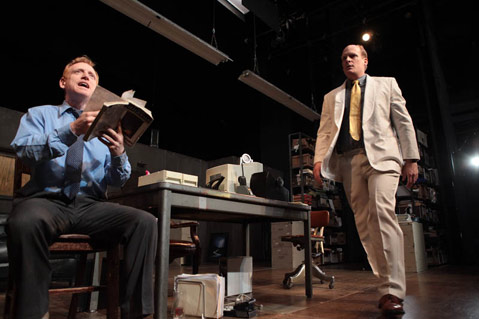The Great Gatz
Seven Hours of The Great Gatsby

Few artistic creations are as thrilling as those that emerge when a person or ensemble takes a huge risk, and succeeds brilliantly. Such is the case with Gatz, the celebrated adaptation of The Great Gatsby by the New York-based experimental theater company Elevator Repair Service.
Highly acclaimed in New York and London, this unlikely triumph is making its California debut in a brief run (through Dec. 9) at REDCAT, the small theater inside Walt Disney Concert Hall in downtown Los Angeles.
Let’s start with a couple of particulars, which might (but shouldn’t) drive you away. First, the show is long: Most performances start at 2 p.m. and end around 10:15. There are two 15-minute intermissions and a dinner break, which leaves us with nearly seven hours of theater.
What’s amazing is how totally absorbing the experience is, and how quickly the hours fly by. I found myself getting antsy on a couple of occasions, but was soon sucked back into the story; each time the actors announced a break, I actually felt a tinge of disappointment.
The second item to note is that this is a line-by-line, literal reading of F. Scott Fitzgerald’s celebrated novel, the tragic story of a millionaire’s attempt to win back the love of the charismatic woman who left him for another man years earlier.
But it’s anything but dry and static. Gatz is a fully staged, smartly conceived theater piece, in which the set, costumes, music, and sound effects all play crucial roles.
Director John Collins and his brilliant cast have framed the narrative as a story-within-a-story. The setting is a drab office; the aged furniture could have come from the 1920s, when Gatsby takes place, but a malfunctioning computer suggests the action is happening today.
Unable to get his aforementioned Dell to function, a bored functionary opens up a copy of Fitzgerald’s book and begins to read it out loud. He’s ignored by his colleagues at first, but gradually they join in, assuming the roles of various characters.
For much of the piece, the humdrum activities of the office continue even as Fitzgerald’s story unfolds. The person reading the novel (usually Scott Shepherd, who assumes the role of narrator Nick Carraway) will take a moment to sign an important document, or place a piece of paper in a file, before moving onto the next paragraph.
These mundane activities act as a kind of counterpoint: In sometimes amusing and sometimes subtly touching ways, they augment and amplify the story. When things get really intense in Fitzgerald’s world, they fade away, only to reassert themselves later, as if a picture frame is being put back into place.
Aside from Shepherd, whose rote recitation of the early pages gradually turns wryly expressive, the acting isn’t especially subtle. This is by design. Occasionally, Fitzgerald will describe a character’s facial expression, and the actor will respond with an amusingly exaggerated contortion of their features.
And yet, as in opera, the artificiality of the presentation heightens our emotional involvement in the material. It’s a form of theatrical alchemy: We’re constantly reminded that we’re being told a story, yet we’re gradually drawn into that tale to the point where we’re utterly captivated.



